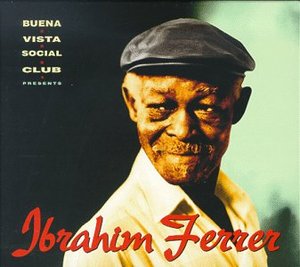Ibrahim Ferrer
|
|
Ibrahim Ferrer (born February 20 1927) is a popular Afro-Cuban musician in Cuba.
Born at a dance in San Luis, near the city of Santiago de Cuba, Ferrer's mother died when he was 12, leaving him orphaned and forcing him to sing on the streets to earn money. The next year, Ferrer joined his first ever musical group, a duet alongside his cousin called Jovenes del Son (Spanish: Youths of Son). They performed at private functions and the two youths managed to scrape together enough money to live.
Over the next few years, Ferrer would perform with many musical groups, including Conjunto Sorpresa and Orquesta Chepin-Choven.
The leader of the latter composed one of Ferrer's biggest hits, "El Platanal de Bartolo".
In 1953 Ferrer started to with Pacho Alonso's group in Santiago. In 1959 the group moved permanently to Havana, renaming themselves Los Bocucos, after a type of drum widely used in Santiago.
With Alonso, Ferrer primarily performed guarachas, sones and other sorts of up-tempo songs. However, he yearned to sing boleros. It was not until almost 40 years later, with the release of Ry Cooder's Grammy Award winning Buena Vista Social Club film in 1999, that Ibrahim Ferrer's talent as a bolero singer would become widely known.
In 1996, Ferrer took part in the World Circuit sessions, when it was announced than an old-style bolero singer would be required. In that year, he recorded the album A Toda Cuba le Gusta with the Afro-Cuban All Stars, an album nominated for a Grammy Award.
In 1998 he recorded an album for the Cuban label EGREM, Tierra Caliente: Ibrahim Ferrer con Los Bocucos. It features Ferrer's unique voice and phrasing, band leader Roberto Correra's rich, intricate arrangements and excellent lead trumpet, and tight, rhythmic playing by the Bocucos. The album's is in the style of son-jazz big band fusion.
In 1999 Ry Cooder recorded Ferrir's first solo album, shown above.
The youngest member of the Buena Vista Social Club, Ferrer still tours internationally, and released his second solo recording, Buenos Hermanos, in 2003. He is an adherent of the Santería faith, a blending of traditional African religions and Catholicism.

